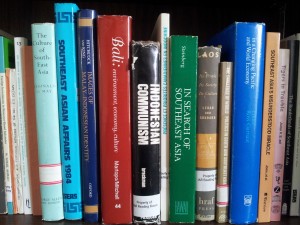Memo #316
Advancing the project of Comparative Area Studies and fruitful Area Studies Comparisons: an Intervention from Europe
By Jürgen Rüland – juergen.rueland [at] politik.uni-freiburg.de & Mikko Huotari – mikko.huotari [at] merics.de
There is no universal ultimate golden mean between disciplinary research and area studies. Viable intermediate positions are eventually dependent on an individual researcher’s capacity and flexibility, and probably even more on new forms of collaborative research, pedagogy and institutional frameworks. But interdisciplinary dialogue about what comparisons can achieve and what constitutes meaningful context are essential in reassessing the purpose of area studies, political science, and on substantive questions in Southeast Asian Studies.
In 2007, Carlo Bonura claimed that “Area Studies must address more generally how it relates to this task of comparison,” and some progress has been made since then. One such attempt is what is called, “Comparative Area Studies” (CAS), whose key characteristics we see as: (1) a strong emphasis on context sensitivity and its historical grounding and which entails clearly bounded generalizations; (2) multiple comparative dimensions; (3) methodological pluralism but self-consciousness; and (4) explicitness with regard to the conceptual assumptions underpinning research.
Comparison should be considered as a core element for many forms of research (design) that is not tied to any particular kind of knowledge-production and that might help in cultivating contact zones among researchers from different (sub-)disciplines. The discussion we try to advance in our recently published Special Issue on “Context, Concepts and Comparisons in Southeast Asian Studies” is therefore not meant as a disciplinarian movement against area studies. On the contrary, methodology benefits from grounding in substantive research and needs to “converse” with area studies knowledge that consciously takes into account the expertise of local scholarship.
To bring to fore the methodological potentials and pitfalls of bridging comparative research and area studies we need to acknowledge multiple comparative dimensions and a plentitude of comparative practices: the methodological pluralism of fruitful area studies comparisons. This also entails reframing the older political science debate about making concepts ready for temporal and spatial travel.
About the Authors:
Jürgen Rüland is professor of Political Science at the University of Freiburg, Germany.
Mikko Huotari is a Research Associate at the Mercator Institute for China Studies (MERICS) in Berlin.
 Links:
Links:
- Carlo Bonura and Laurie J. Sears, “Introduction: Knowledges that Travel in Southeast Asian Area Studies,” in Knowing Southeast Asian Subjects (2007)
- “Context, Concepts and Comparisons in Southeast Asian Studies,” a Special Issue of Pacific Affairs (September 2014)
Comments are closed, but trackbacks and pingbacks are open.